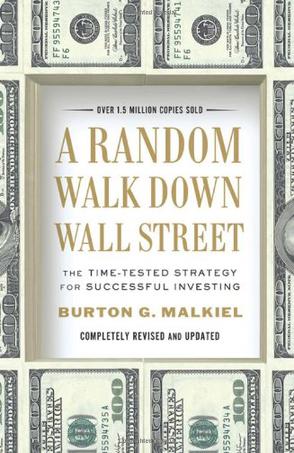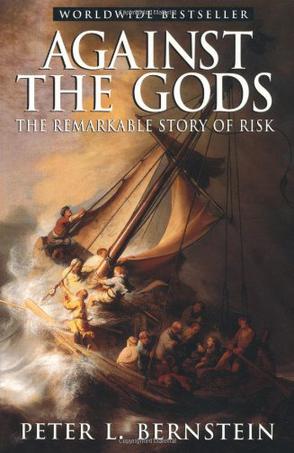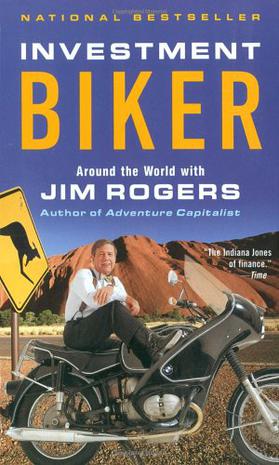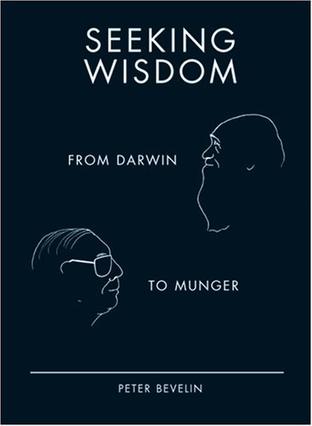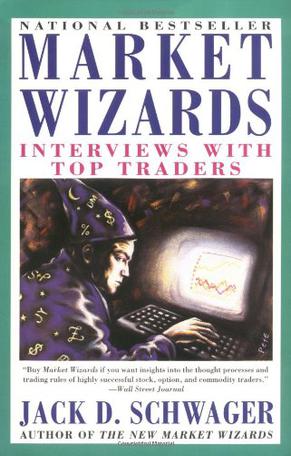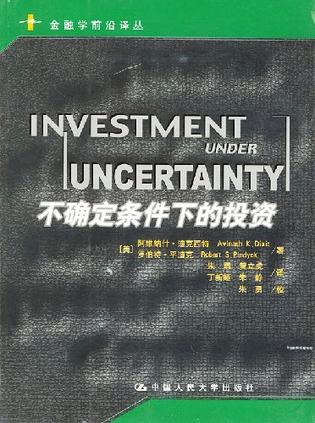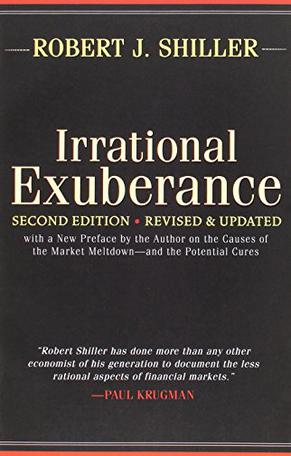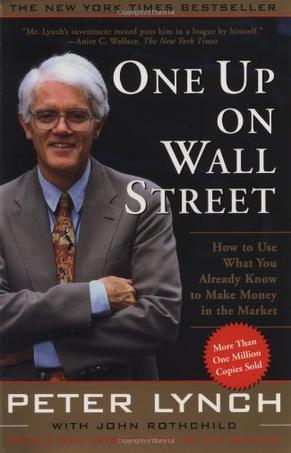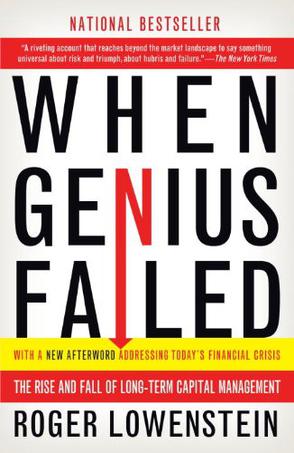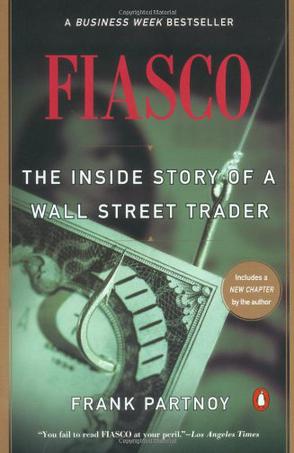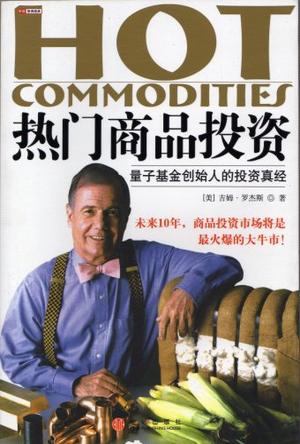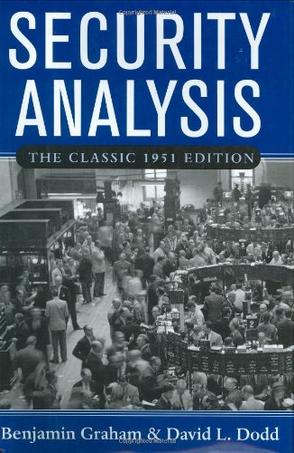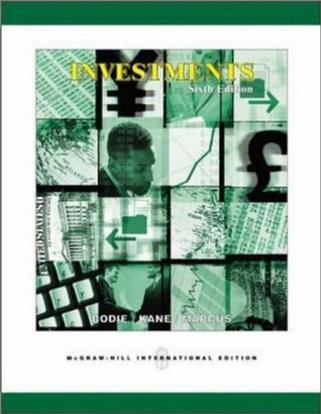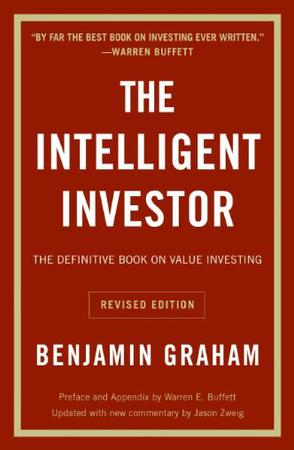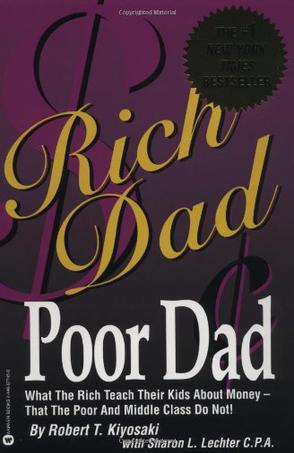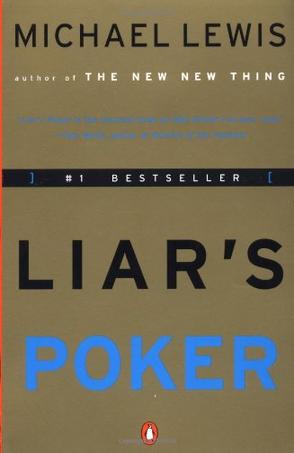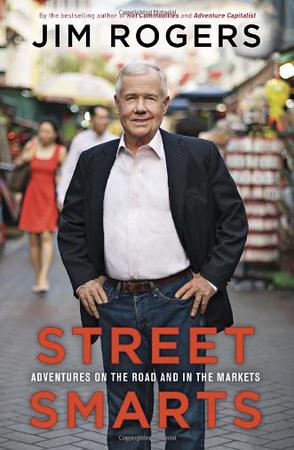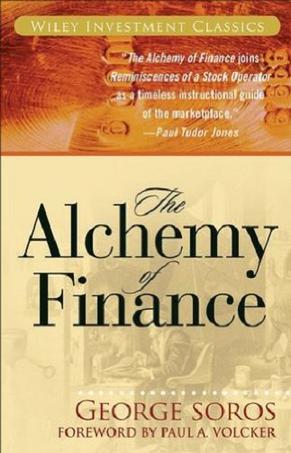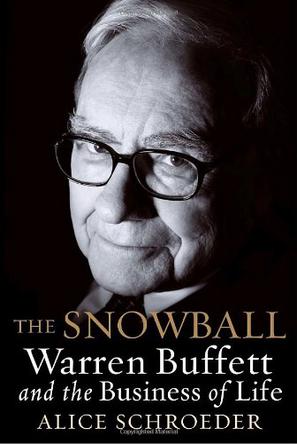欢迎来到相识电子书!
标签:investment
-
A Random Walk Down Wall Street
点击链接进入中文版: 漫步华尔街(原书第9版) -
Against the Gods
在线阅读本书 Book Description Human existence is based upon risk. This text charts the adventures of a group of thinkers who embarked on a voyage of intellectual discovery, transforming primeval superstition into the powerful tools of risk control employed today. Amazon.com With the stock market breaking records almost daily, leaving longtime market analysts shaking their heads and revising their forecasts, a study of the concept of risk seems quite timely. Peter Bernstein has written a comprehensive history of man's efforts to understand risk and probability, beginning with early gamblers in ancient Greece, continuing through the 17th-century French mathematicians Pascal and Fermat and up to modern chaos theory. Along the way he demonstrates that understanding risk underlies everything from game theory to bridge-building to winemaking. From Publishers Weekly Risk management, which assumes that future risks can be understood, measured and to some extent predicted, is the focus of this solid, thoroughgoing history. Probability theory, pioneered by 17th-century French mathematicians Blaise Pascal and Pierre de Fermat, has made possible the design of great bridges, electric power utilities and insurance policies. The statistical sampling methods invented by dour Swiss scientist Jacob Bernoulli undergird diverse activities such as the testing of new drugs, stock-picking and wine tasting. Bernstein (Capital Ideas) animates his narrative with a colorful cast of risk-analyzers, including gambling addict Girolamo Cardano, 16th-century Italian physician to the Pope; and John Maynard Keynes, whose concerns over economic uncertainty compelled him to recommend an active, interventionist role for government. Bernstein also traces the development of business forecasting, game theory, insurance and derivatives, and surveys recent advances in risk forecasting made possible through chaos theory and by the development of neural networks. From Library Journal For several centuries, mathematics has been the language of the exact sciences. Only in the 20th century has mathematics become predominant in other fields, particularly economics and finance. In this book, Bernstein (Capital Ideas: The Improbable Origins of Modern Wall Street, LJ 12/91), head of an economic consulting firm, traces the development of probability theory from its beginnings in analyzing games of chance, through its application to statistical theory and insurance, up to its present use in developing investment strategies to control risk. He includes excellent sections on portfolio analysis and on investments in derivatives. Bernstein clearly describes the people, their work, and the events that have revolutionized the thinking on Wall Street. A worthwhile acquisition for business and math collections. Harold D. Shane, Baruch Coll., CUNY From Booklist Bernstein's lively history chronicles a profound transformation in attitudes about the future. How one's fate changed from depending less on capricious outcomes and more on predictable ones forms the backbone of the narrative. His central characters are mathematicians who began pondering the statistics of gambling, or gamblers pondering the risks of gambling: about one sixteenth-century polymath, Girolamo Cardano, Bernstein writes that his "credentials as a gambling addict alone would justify his appearance in the history of risk," and that comment is typical of Bernstein's engaging presentation. Amid his recounting of the insights into probability from Pascal to Keynes, he touches on an array of modern fields in which risk analysis is crucial--insurance, commodities futures, stock markets, and that old standard, gambling. This cornucopia of biographical sketches, mathematical examples, and reflections on the nature of human expectations about the future faces little risk of idling in libraries; patrons of the business section might be keenest to read it. Gilbert Taylor From AudioFile Jesse Boggs honed his expressive, laid-back vocal style narrating his own award-winning documentaries. Here, as reader and abridger, he goes a long way to clarify Bernstein's convoluted theory of risk management. His careful phrasing also brings into high relief the sweeping generalizations and questionable axioms that give pause to the analytic listener. Only in this careful frame of mind can one separate wheat from chaff and learn whatever this book has to teach. Y.R. The Washington Post Book World, September 20, 1998 AGAINST THE GODS appeared in the "Washington Is Also Reading..." section of The Washington Post Book World. The book is described as, "A comprehensive history of man's efforts to understand risk and probability, from ancient gamblers in Greece to modern chaos theory." Book Dimension length: (cm)22.7 width:(cm)15.2 -
Investment Biker
Legendary investor Jim Rogers gives us his view of the world on a twenty-two-month, fifty-two-country motorcycle odyssey in his bestselling business/adventure book, Investment Biker , which has already sold more than 200,000 copies. Before you invest another dollar anywhere in the world (including the United States), read this book by the man Time magazine calls “the Indiana Jones of finance.” Jim Rogers became a Wall Street legend when he co-founded the Quantum Fund. Investment Biker is the fascinating story of Rogers’s global motorcycle journey/investing trip, with hardheaded advice on the current state and future direction of international economies that will guide and inspire investors interested in foreign markets. -
Seeking Wisdom
Peter Bevelin begins his fascinating book with Confucius' great wisdom: "A man who has committed a mistake and doesn't correct it, is committing another mistake." Seeking Wisdom is the result of Bevelin's learning about attaining wisdom. His quest for wisdom originated partly from making mistakes himself and observing those of others but also from the philosophy of super-investor and Berkshire Hathaway Vice Chairman Charles Munger. A man whose simplicity and clarity of thought was unequal to anything Bevelin had seen. In addition to naturalist Charles Darwin and Munger, Bevelin cites an encyclopedic range of thinkers: from first-century BCE Roman poet Publius Terentius to Mark Twain—from Albert Einstein to Richard Feynman—from 16th Century French essayist Michel de Montaigne to Berkshire Hathaway Chairman Warren Buffett. In the book, he describes ideas and research findings from many different fields. This book is for those who love the constant search for knowledge. It is in the spirit of Charles Munger, who says, "All I want to know is where I'm going to die so I'll never go there." There are roads that lead to unhappiness. An understanding of how and why we can "die" should help us avoid them. We can't eliminate mistakes, but we can prevent those that can really hurt us. Using exemplars of clear thinking and attained wisdom, Bevelin focuses on how our thoughts are influenced, why we make misjudgments and tools to improve our thinking. Bevelin tackles such eternal questions as: Why do we behave like we do? What do we want out of life? What interferes with our goals? Read and study this wonderful multidisciplinary exploration of wisdom. It may change the way you think and act in business and in life. -
Market Wizards
A bestselling classic (more than 200,000 copies sold in hardcover and paperback) that delves into the minds of some of the world's most successful traders. -
不确定条件下的投资
企业是否应当,以及何时投资于新资本设备,增加工作组,或者开发新产品?为什么投资的传统经济模型未能解释美国和其他国家的投资开支活动?在本书中,阿维纳什·迪克西特和罗怕特·平迪克提供了一种关于企业资本投资决策的新理论,强调了大多数投资决策中的不可逆性,以及作出这些决策时经济环境中的不确定性。利用这种方法,他们回答了投资决策和投资支出出行为中的上述问题以及其他重要问题。 关于投资的这种新方法认识到了等待更好(但永远不完全)信息的期权价值。它利用了金融市场期权理论的一种类推,这使它比传统投资理论拥有一种更丰富的动态框架。作者以一种清晰而且系统的方式阐述了这种新理论,而且还巩固、综合并拓展了从这种理论中发展出来的各种研究领域。 本书揭示了理解企业投资行为的重要性。它阐述了这种理论在投资的产业动态均衡和政府政策方面的影响,还揭示了这种理论如何应用到特定产业及各种更宽泛的商业问题。 作者简介: 罗伯特·平迪克 麻省理工学院斯隆管理学院三菱银行经济学讲座教授。他的著作包括《世界能源需求结构》(麻省理工学院出版社),与丹尼尔·鲁宾菲尔德(Danel L.Lubinfeld)合著的《计量经济模型与经济预测》(麦吉尔出版社)(中译本由机械工业出版社出版),以及《微观经济学》(麦克米伦出版公司)(中译本由中国人民大学出版社出版)等。 阿维纳什·迪克西特,普林斯顿大学约翰·J·F·谢勒德(Jolm J.F.Sherrerd')第52任大学经济学讲座教授。他的著作包括与维克多·诺曼(Victor Norman)合著的《国际贸易理论》(剑桥大学出版社),与巴利·内拉巴夫(Barry Nalebuff)合著的《战略性思考》(诺顿出版公司)。 -
Irrational Exuberance
《非理性繁荣》书名取自美国联邦准备理事会理事主席葛林史班 1996 年底在华府希尔顿饭店演讲中,谈到当时美国金融资产价格泡沫时所引用的一句名言。从那时起,许多学者、专家都注意到美国股市因投机风气过盛而引发的投资泡沫现象。 Book Description In this timely and prescient update of his celebrated 2000 bestseller, Robert Shiller returns to the topic that gained him international fame: market volatility. Having predicted the stock market collapse that began just one month after the first edition was published, he now expands the book to cover other markets that have become volatile, particularly the recently red-hot housing market. He includes a full chapter on domestic and international housing prices in historical perspective. Shiller amasses impressive evidence to support his argument that the recent housing market boom bears many similarities to the stock market bubble of the late 1990s, and may eventually be followed by declining home prices for years to come. After stocks plummeted when the bubble burst in 2000, investors moved their money into housing. This precipitated the inflated real estate prices not only in America but around the world, Shiller maintains. Hence, irrational exuberance did not disappear—it merely reappeared in other settings. Building on the original edition, Shiller draws out the psychological origins of volatility in financial markets, this time folding real estate into his analysis. He broadens the evidence that investing in capital markets of all kinds in the modern free-market economy is inherently unstable—subject to the profoundly human influences captured in Alan Greenspan’s now-famous phrase, “irrational exuberance.” As was true of its predecessor, the second edition of Irrational Exuberance is destined to be widely read, discussed, and debated. Amazon.com CNBC, day trading, the Motley Fool, Silicon Investor--not since the 1920s has there been such an intense fascination with the U.S. stock market. For an increasing number of Americans, logging on to Yahoo! Finance is a habit more precious than that morning cup of joe (as thousands of SBUX and YHOO shareholders know too well). Yet while the market continues to go higher, many of us can't get Alan Greenspan's famous line out of our heads. In Irrational Exuberance, Yale economics professor Robert J. Shiller examines this public fascination with stocks and sees a combination of factors that have driven stocks higher, including the rise of the Internet, 401(k) plans, increased coverage by the popular media of financial news, overly optimistic cheerleading by analysts and other pundits, the decline of inflation, and the rise of the mutual fund industry. He writes: "Perceived long-term risk is down.... Emotions and heightened attention to the market create a desire to get into the game. Such is irrational exuberance today in the United States." By history's yardstick, Shiller believes this market is grossly overvalued, and the factors that have conspired to create and amplify this event--the baby-boom effect, the public infatuation with the Internet, and media interest--will most certainly abate. He fears that too many individuals and institutions have come to view stocks as their only investment vehicle, and that investors should consider looking beyond stocks as a way to diversify and hedge against the inevitable downturn. This is a serious and well-researched book that should read like a Stephen King novel to anyone who has staked his or her future on the market's continued success. --Harry C. Edwards From The New Yorker During the past decade, he has emerged as a leader in the new field of "behavioral finance" which seeks to apply lessons learned from other academic disciplines, particularly psychology to economics. Irrational Exuberance is not just a prophecy of doom. Encompassing history, sociology, and biology, as well as psychology and economics, it is a serious attempt to explain how speculative bubbles come about and how they sustain themselves. John Cassidy From Library Journal Taking his book's title and thesis from Alan Greenspan's 1996 description of investors, Shiller (economics, Yale Univ.) studies the current booming U.S. stock market in historical terms. His research into past U.S. and international markets indicates that during every speculative bubble there was always widespread consensus that high valuations were justified by each market's special circumstances. Every large market correction seemed to result from popular consensus rather than specific events or news. Shiller says that past bull and bear markets, though often based initially on sound fundamental reasoning, fed upon themselves to go beyond what the facts justified. He challenges the efficient market theory, demonstrating that markets cannot be explained historically by the movement of company earnings or dividends. He concludes that the current U.S. stock market is a speculative bubble awaiting correction. While the book certainly belongs in all academic business collections, public libraries should also purchase it as a counterweight to the plethora of get-rich-quick investment guides. -Lawrence R. Maxted, Gannon Univ., Erie, PA From The New York Times Book Review No one has explored the strange behavior of the American investor in the 1990's with more authority, or better timing, than Robert J. Shiller. Louis Uchitelle About Author Robert J. Shiller is the Stanley B. Resor Professor of Economics at Yale University. He is the recipient of the 2000 Commonfund Prize, awarded for Best Contribution to Endowment Management Research, for Irrational Exuberance. He is also the author of Market Volatility and Macro Markets, which won the 1996 Paul A. Samuelson Award. Book Dimension : length: (cm)23.3 width:(cm)15.4 -
One Up On Wall Street
Book Description THE NATIONAL BESTSELLING BOOK THAT EVERY INVESTOR SHOULD OWN Peter Lynch is America's number-one money manager. His mantra: Average investors can become experts in their own field and can pick winning stocks as effectively as Wall Street professionals by doing just a little research. Now, in a new introduction written specifically for this edition of One Up on Wall Street, Lynch gives his take on the incredible rise of Internet stocks, as well as a list of twenty winning companies of high-tech '90s. That many of these winners are low-tech supports his thesis that amateur investors can continue to reap exceptional rewards from mundane, easy-to-understand companies they encounter in their daily lives. Investment opportunities abound for the layperson, Lynch says. By simply observing business developments and taking notice of your immediate world -- from the mall to the workplace -- you can discover potentially successful companies before professional analysts do. This jump on the experts is what produces "tenbaggers," the stocks that appreciate tenfold or more and turn an average stock portfolio into a star performer. The former star manager of Fidelity's multibillion-dollar Magellan Fund, Lynch reveals how he achieved his spectacular record. Writing with John Rothchild, Lynch offers easy-to-follow directions for sorting out the long shots from the no shots by reviewing a company's financial statements and by identifying which numbers really count. He explains how to stalk tenbaggers and lays out the guidelines for investing in cyclical, turnaround, and fast-growing companies. Lynch promises that if you ignore the ups and downs of the market and the endless speculation about interest rates, in the long term (anywhere from five to fifteen years) your portfolio will reward you. This advice has proved to be timeless and has made One Up on Wall Street a number-one bestseller. And now this classic is as valuable in the new millennium as ever. From Publishers Weekly The authors argue that average investors can beat Wall Street professionals by using the information gleaned from everyday life. "Investors will be able to put the shrewd insights presented to good use," remarked PW. 200,000 first printing. Book Dimension length: (cm)20.6 width:(cm)14 -
When Genius Failed
On September 23, 1998, the boardroom of the New York Fed was a tense place. Around the table sat the heads of every major Wall Street bank, the chairman of the New York Stock Exchange, and representatives from numerous European banks, each of whom had been summoned to discuss a highly unusual prospect: rescuing what had, until then, been the envy of them all, the extraordinarily successful bond-trading firm of Long-Term Capital Management. Roger Lowenstein's When Genius Failed is the gripping story of the Fed's unprecedented move, the incredible heights reached by LTCM, and the firm's eventual dramatic demise. Lowenstein, a financial journalist and author of Buffett: The Making of an American Capitalist, examines the personalities, academic experts, and professional relationships at LTCM and uncovers the layers of numbers behind its roller-coaster ride with the precision of a skilled surgeon. The fund's enigmatic founder, John Meriwether, spent almost 20 years at Salomon Brothers, where he formed its renowned Arbitrage Group by hiring academia's top financial economists. Though Meriwether left Salomon under a cloud of the SEC's wrath, he leapt into his next venture with ease and enticed most of his former Salomon hires--and eventually even David Mullins, the former vice chairman of the U.S. Federal Reserve--to join him in starting a hedge fund that would beat all hedge funds. LTCM began trading in 1994, after completing a road show that, despite the Ph.D.-touting partners' lack of social skills and their disdainful condescension of potential investors who couldn't rise to their intellectual level, netted a whopping $1.25 billion. The fund would seek to earn a tiny spread on thousands of trades, "as if it were vacuuming nickels that others couldn't see," in the words of one of its Nobel laureate partners, Myron Scholes. And nickels it found. In its first two years, LTCM earned $1.6 billion, profits that exceeded 40 percent even after the partners' hefty cuts. By the spring of 1996, it was holding $140 billion in assets. But the end was soon in sight, and Lowenstein's detailed account of each successively worse month of 1998, culminating in a disastrous August and the partners' subsequent panicked moves, is riveting. The arbitrageur's world is a complicated one, and it might have served Lowenstein well to slow down and explain in greater detail the complex terms of the more exotic species of investment flora that cram the book's pages. However, much of the intrigue of the Long-Term story lies in its dizzying pace (not to mention the dizzying amounts of money won and lost in the fund's short lifespan). Lowenstein's smooth, conversational but equally urgent tone carries it along well. The book is a compelling read for those who've always wondered what lay behind the Fed's controversial involvement with the LTCM hedge-fund debacle. --S. Ketchum -
Fiasco
在线阅读本书 FIASCO is the shocking story of one man's education in the jungles of Wall Street. As a young derivatives salesman at Morgan Stanley, Frank Partnoy learned to buy and sell billions of dollars worth of securities that were so complex many traders themselves didn't understand them. In his behind-the-scenes look at the trading floor and the offices of one of the world's top investment firms, Partnoy recounts the macho attitudes and fiercely competitive ploys of his office mates. And he takes us to the annual drunken skeet-shooting competition, FIASCO, where he and his colleagues sharpen the killer instincts they are encouraged to use against their competitiors, their clients, and each other. FIASCO is the first book to take on the derivatves trading industry--the most highly charged and risky sector of the stock market. More importantly, it is a blistering indictment of the largely unregulated market in derivatives and serves as a warning to unwary investors about real fiascos, which have cost billions of dollars. -
热门商品投资
《热门商品投资:量子基金创始人的投资真经》讲述股票低头,商品抬头——商品投资市场已进入长期牛市!未来10年,商品投资市场将是最火爆的大牛市!从历史看,商品价格与股票、债券等金融工具价格走向呈现负相关。股票价格下跌,商品价格就上场,反之亦然。这意味着如果不投资商品,你就不是真正的多样化投资。商品价格即使在经济倒退时也能上涨。商品投资回报率境长速度超过通贷膨胀增长速度。股票价格可能为零,而商品不会。跟公司股票不一样,商品是实物,对某些人总会有价值。亚洲经济持续增长,将带来世界范围所有商品需求的强劲增长。特别是中国,迅速从一个商品出口国变为了商品进口国,需要消费大是铁矿石、铜、石油、大豆和其他原材料。 -
Security Analysis
在线阅读本书 With nearly a million copies sold, Security Analysis has been continuously in print for more than sixty years. No investment book in history had either the immediate impact, or the long-term relevance and value, of its first edition in 1934. By 1951, seventeen years past its original publication and more than a decade beyond its revised and acclaimed 1940 second edition, authors Benjamin Graham and David Dodd had seen business and investment markets travel from the depths of Depression to the heights of recovery, and had observed investor behavior during both the calm of peacetime and the chaos of World War II. The prescient thinking and insight displayed by Graham and Dodd in the first two editions of Security Analysis reached new heights in the third edition. In words that could just as easily have been written today as fifty years ago, they detail techniques and strategies for attaining success as individual investors, as well as the responsibilities of corporate decision makers to build shareholder value and transparency for those investors. The focus of the book, however, remains its timeless guidance and advice--that careful analysis of balance sheets is the primary road to investment success, with all other considerations little more than distractions. The authors had seen and survived the Great Depression as well as the political and financial instabilities of World War II and were now better able to outline a program for sensible and profitable investing in the latter half of the century. Security Analysis: The Classic 1951 Edition marks the return of this long-out-of-print work to the investment canon. It will reacquaint you with the foundations of value investing--more relevant than ever in tumultuous twenty-first century markets--and allow you to own the third installment in what has come to be regarded as the most accessible and usable title in the history of investment publishing. -
Investments
Bodie, Kane, and Marcus' "Investments" is the leading textbook for the graduate/MBA investments market. It is recognized as the best blend of practical and theoretical coverage, while maintaining an appropriate rigor and clear writing style. Its unifying theme is that security markets are nearly efficient, meaning that most securities are usually priced appropriately given their risk and return attributes. The text places greater emphasis on asset allocation, and offers a much broader and deeper treatment of futures, options, and other derivative security markets than most investment texts. -
Security Analysis
《证券分析(第6版)》在长达70年的时间里共发行了5版,计有百万册,充当了无数美国最杰出投资家的启蒙教程,加上本杰明·格雷厄姆与戴维·多德两人在华尔街创下的不朽业绩,使得《证券分析》一书成为投资方面不史以来最有影响力的著作。从它于1934年问世以来,至今仍是人们最为关注的书籍,被誉为投资者的圣经。这部著作是华尔街的经典,也是奠定格雷厄姆声誉的里程碑。书中第一次阐述了寻找“物美价廉”的股票和债券的方法,这些方法在格雷厄姆去世后20年依然适用。 "A road map for investing that I have now been following for 57 years." --From the Foreword by Warren E. Buffett . First published in 1934, Security Analysis is one of the most influential financial books ever written. Selling more than one million copies through five editions, it has provided generations of investors with the timeless value investing philosophy and techniques of Benjamin Graham and David L. Dodd. . As relevant today as when they first appeared nearly 75 years ago, the teachings of Benjamin Graham, �the father of value investing,� have withstood the test of time across a wide diversity of market conditions, countries, and asset classes. . This new sixth edition, based on the classic 1940 version, is enhanced with 200 additional pages of commentary from some of today�s leading Wall Street money managers. These masters of value investing explain why the principles and techniques of Graham and Dodd are still highly relevant even in today�s vastly different markets. The contributor list includes: . Seth A. Klarman, president of The Baupost Group, L.L.C. and author of Margin of Safety . James Grant, founder of Grant's Interest Rate Observer , general partner of Nippon Partners. Jeffrey M. Laderman, twenty-five year veteran of BusinessWeek . Roger Lowenstein , author of Buffett: The Making of an American Capitalist and When America Aged and Outside Director, Sequoia Fund. Howard S. Marks, CFA, Chairman and Co-Founder, Oaktree Capital Management L.P.. J. Ezra Merkin, Managing Partner, Gabriel Capital Group .. Bruce Berkowitz, Founder, Fairholme Capital Management.. Glenn H. Greenberg, Co-Founder and Managing Director, Chieftain Capital Management. Bruce Greenwald, Robert Heilbrunn Professor of Finance and Asset Management, Columbia Business School. David Abrams, Managing Member, Abrams Capital. . Featuring a foreword by Warren E. Buffett (in which he reveals that he has read the 1940 masterwork �at least four times�), this new edition of Security Analysis will reacquaint you with the foundations of value investing�more relevant than ever in the tumultuous 21st century markets. . (20080617) 点击链接进入中文版: 证券分析(上)(原书第6版) -
The Intelligent Investor
More than one million hardcovers soldNow available for the first time in paperback!The Classic Text Annotated to Update Graham s Timeless Wisdom for Today s Market ConditionsThe greatest investment advisor of the twentieth century, Benjamin Graham taught and inspired people worldwide. Graham s philosophy of "value investing" -- which shields investors from substantial error and teaches them to develop long-term strategies -- has made The Intelligent Investor the stock market bible ever since its original publication in 1949.Over the years, market developments have proven the wisdom of Graham s strategies. While preserving the integrity of Graham s original text, this revised edition includes updated commentary by noted financial journalist Jason Zweig, whose perspective incorporates the realities of today s market, draws parallels between Graham s examples and today s financial headlines, and gives readers a more thorough understanding of how to apply Graham s principles.Vital and indispensable, this HarperBusiness Essentials edition of The Intelligent Investor is the most important book you will ever read on how to reach your financial goals. -
Rich Dad, Poor Dad
Rich Dad, Poor Dad chronicles the story of the authors two dads, his own father, who wa the superintendent of education in Hawaii and who ended up dying penniless and his best friends father who dropped out of school at age 13 and went on to become one of the wealthiest men in Hawaii. Kiyosaki uses the story of these two men and their varying financial strategies to illustrate the need for a new financial paradigm in order to achieve financial success in the new millennium. -
Liar's Poker
This is a great book to see in life in Investment Bank and Wall Street. Perhaps it's just a novel, but it can offer much more to the reader. -
Street Smarts
Wall Street legend and bestselling author Jim Rogers offers investing insights and economic, political, and social analysis, drawing on lessons and observations from his lifetime in the markets. Jim Rogers, whose entertaining accounts of his travels around the world -- studying the markets from Russia to Singapore from the ground up-- has enthralled readers, investors and Wall Street aficionados for two decades in such books as "Investment Biker," "Adventure Capitalist," "Hot Commodities" and "A Bull In China" . In his engaging memoir "Street Smarts," Rogers offers pithy commentary from a lifetime of adventure, from his early years growing up a naive kid in Demopolis, Alabama, to his fledgling career on Wall Street, to his cofounding the wildly successful Quantum Fund. Rogers always had a restless curiosity to experience and understand the world around him. In "Street Smarts," he takes us through the highlights of his life in the financial markets, from his school days at Yale and Oxford -- where despite the fact that he didn't have enough money to afford the appropriate pair of shoes, he coxed the crew and helped to win the Oxford-Cambridge Boat Race as well as the Thames Cup, the first of his three Guiness World Records -- to his first heady taste of Wall Street in the mid - 1960s, and his years helping to run the most successful hedge fund on Wall Street. As a result of his extraordinary success with the Quantum Fund, Rogers was able to retire at the age of thirty-seven. Since then he has taught classes in finance at Columbia University, hosted television programs, and traveled the world seeing firsthand how revolutions in Chile affect coffee prices in Seattle, and how shortages of copper in Africa affect electricity brownouts in Ohio. In the course of his new book, Rogers offers often surprising observations on how the world works - and what trends he sees in the future. He explains why Asia will be the dominant economic force in the twenty-first century - and how he and his wife and two daughters moved to Singapore to prepare his family for the coming changes.. He discusses why America and the European Union are in decline, and what we need to do to right our economy and society. The age of Wall Street, Rogers claims, when the finance industry drove 25% of America's growth, is over. Tomorrow's economy will be driven by those who make things - food, energy, goods and consumables. Regarded as one of the most astute investors Wall Street has ever known, Jim Rogers once again is at his acerbic and storytelling best. -
The Alchemy of Finance
在线阅读本书 Book Description New chapter by Soros on the secrets to his success along with a new Preface and Introduction. New Foreword by renowned economist Paul Volcker "An extraordinary ... inside look into the decision-making process of the most successful money manager of our time. Fantastic." - "The Wall Street Journal". George Soros is unquestionably one of the most powerful and profitable investors in the world today. Dubbed by "BusinessWeek" as "the Man who Moves Markets," Soros made a fortune competing with the British pound and remains active today in the global financial community. Now, in this special edition of the classic investment book, "The Alchemy of Finance", Soros presents a theoretical and practical account of current financial trends and a new paradigm by which to understand the financial market today. This edition's expanded and revised Introduction details Soros's innovative investment practices along with his views of the world and world order. He also describes a new paradigm for the "theory of reflexivity" which underlies his unique investment strategies. Filled with expert advice and valuable business lessons, "The Alchemy of Finance" reveals the timeless principles of an investing legend. This special edition will feature a new chapter by Soros on the secrets of his success and a new Foreword by the Honorable Paul Volcker, former Chairman of the Federal Reserve. George Soros (New York, NY) is President of Soros Fund Management and Chief Investment Advisor to Quantum Fund N.V., a GTB 12 billion international investment fund. Besides his numerous ventures in finance, Soros is also extremely active in the worlds of education, culture, and economic aid and development through his Open Society Fund and the Soros Foundation. Book Dimension length: (cm)22.8 width:(cm)15.4 -
The Snowball
Here is THE book recounting the life and times of one of the most respected men in the world, Warren Buffett. The legendary Omaha investor has never written a memoir, but now he has allowed one writer, Alice Schroeder, unprecedented access to explore directly with him and with those closest to him his work, opinions, struggles, triumphs, follies, and wisdom. The result is the personally revealing and complete biography of the man known everywhere as “The Oracle of Omaha.”Although the media track him constantly, Buffett himself has never told his full life story. His reality is private, especially by celebrity standards. Indeed, while the homespun persona that the public sees is true as far as it goes, it goes only so far. Warren Buffett is an array of paradoxes. He set out to prove that nice guys can finish first. Over the years he treated his investors as partners, acted as their steward, and championed honesty as an investor, CEO, board member, essayist, and speaker. At the same time he became the world’s richest man, all from the modest Omaha headquarters of his company Berkshire Hathaway. None of this fits the term “simple.”When Alice Schroeder met Warren Buffett she was an insurance industry analyst and a gifted writer known for her keen perception and business acumen. Her writings on finance impressed him, and as she came to know him she realized that while much had been written on the subject of his investing style, no one had moved beyond that to explore his larger philosophy, which is bound up in a complex personality and the details of his life. Out of this came his decision to cooperate with her on the book about himself that he would never write.Never before has Buffett spent countless hours responding to a writer’s questions, talking, giving complete access to his wife, children, friends, and business associates—opening his files, recalling his childhood. It was an act of courage, as The Snowball makes immensely clear. Being human, his own life, like most lives, has been a mix of strengths and frailties. Yet notable though his wealth may be, Buffett’s legacy will not be his ranking on the scorecard of wealth; it will be his principles and ideas that have enriched people’s lives. This book tells you why Warren Buffett is the most fascinating American success story of our time.From the Hardcover edition.
热门标签
下载排行榜
- 1 梦的解析:最佳译本
- 2 李鸿章全传
- 3 淡定的智慧
- 4 心理操控术
- 5 哈佛口才课
- 6 俗世奇人
- 7 日瓦戈医生
- 8 笑死你的逻辑学
- 9 历史老师没教过的历史
- 10 1分钟和陌生人成为朋友

